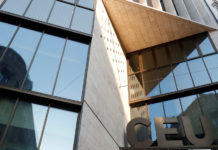That spooked Wall Street, which fears war in Eastern Europe could be imminent.
In addition to the potential for large-scale loss of human life, investors fear a prolonged war between Russia and Ukraine could damage the global economy. Russia remains one of the world’s leading energy exporters, and a war could cut off supply of its natural gas and oil to other countries that depend on it. That could send prices surging at a time when much of the world is already coping with sky-high inflation.
Stocks had started the day higher, following reports that a diplomatic resolution between Russia and Ukraine may be reached before an armed conflict begins. Kremlin spokesperson Dmitry Peskov Monday morning opened the door to negotiations: If Ukraine refused “the idea of joining NATO” it “would significantly contribute to the formulation of a more meaningful response to Russian concerns,” Peskov said.
But the market seesawed throughout the day — falling, then rising again, and then tumbling once more — as Wall Street tried to read the tea leaves from diplomatic statements. Fuzzy crystal balls made for nervous investors.
Ukraine may be top of mind for investors, but it’s far from the only thing concerning Wall Street. Investors continue to watch prices soar, giving them agita about the Fed potentially raising rates higher and faster than expected.
Bullard reiterated his concern that the central bank may not be moving fast enough in response to high inflation, and he repeated his view that the Fed should ramp up interest rates to 1% by July 1.
“Buckle up, a bumpy ride is in the cards,” said Louis Navellier, chairman of Navellier & Associates, in a note to investors. “The Wall of Worry has added a few bricks of uncertainty around inflation, monetary policy, Ukraine, masking and pandemic cases.”
Oil hits $95 a barrel
As investors grow increasingly concerned about the potential of a Russian invasion of Ukraine, US oil prices jumped to $95 a barrel on Monday for the first time since 2014.
After trading flat earlier in the day, crude jumped 2.5% to $95.36 a barrel during afternoon trading. Brent crude, the world benchmark, jumped more than 1.5% to about $96 a barrel.
Natural gas futures also soared 7%, hitting session highs above $4.20 per million BTU.
— CNN Business’ Matt Egan contributed to this report.
Source : CNN













